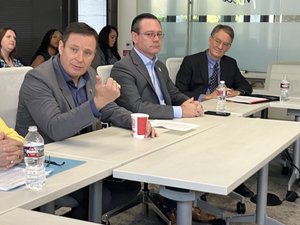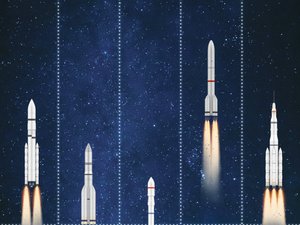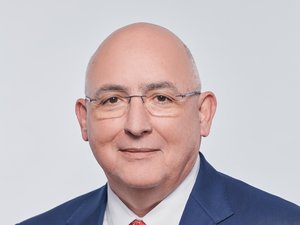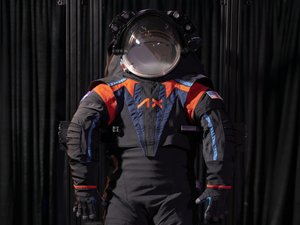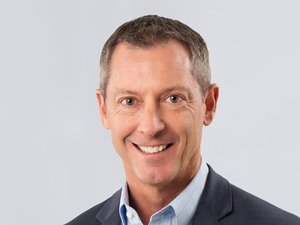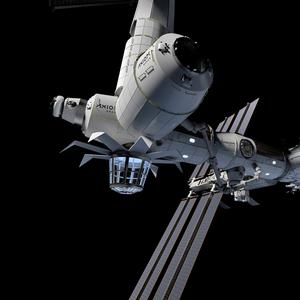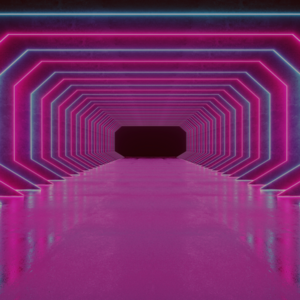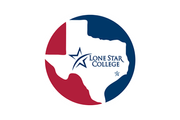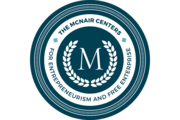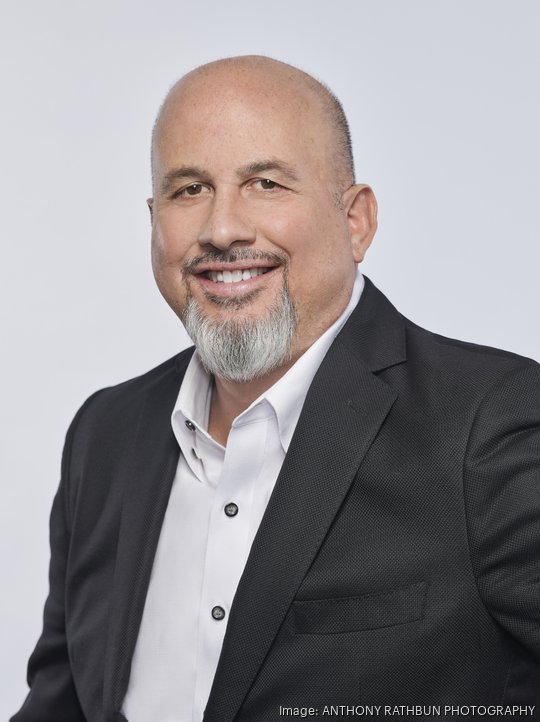
NASA’s Project Morpheus, a 2010 project at the Johnson Space Center to land a spacecraft on the moon, ultimately didn’t make it to the lunar surface despite over a dozen test flights. But it did kickstart the careers of several Houston space business leaders, including Axiom Space President Matt Ondler.
After departing NASA, Ondler helped found Houston Mechatronics, the company that would eventually design seafaring robots and become Nauticus Robotics Inc. (Nasdaq: KITT). But he was soon back to working in space.
While another of Ondler’s colleagues, Intuitive Machines founder Stephen Altemus, did succeed in sending a mission to the moon this year, Ondler is setting his sights on low-Earth orbit. Axiom Space hopes to break into the highly lucrative industry for research and manufacturing with Axiom Station — the company's planned free-flying commercial space station billed as a replacement to the retiring International Space Station.
“In the remarkable 60-year history of the Johnson Space Center, our module will be the first human-rated spacecraft ever built here,” Ondler said. "None of the Apollos, the shuttles, Space Station modules, none of them were built here in Houston. They're all built at various contractors — Boeing, Lockheed — all around the country or around the world. So I think we're trending towards space manufacturing here."
The Axiom Station is set to launch its first module in 2026, and future launches will coincide with the eventual retirement of the ISS by 2031. Ondler said that if the decision to deorbit the Space Station is accelerated, Axiom is ready to adapt its launch timeline.
Ondler joined Axiom Space in 2020 as chief technology officer. He was promoted to president last year, coinciding with the company opening the first phase of its 22-acre campus at the Houston Spaceport in December.
The Houston Business Journal sat down with Ondler to learn more about how Axiom Space’s growth reflects trends in the Houston space industry. This interview has been edited for length and clarity.
How did your NASA work translate to Axiom Space? Any fun NASA stories you can share?
So I worked for Steve Altemus at the time, [and] there were a couple of reasons to do [Project Morpheus]. One, we had some technology that we were working on that we wanted to integrate into a particular vehicle. We also were a little frustrated with the speed at which NASA moved. So we wanted to demonstrate that it was possible to build things quicker, to be more agile.
We started Project M, completely cobbled together from leftover hardware here and some projects over there, and that led to Morpheus, the lunar lander prototype. I was the project manager and ran both of those projects. That technology — the propulsion system, the autonomous navigation, the terrain identification — was deployed on [Intuitive Machines'] lander that made it to the moon. It's a nice story of something starting in NASA and making it to private industry.
But the thing that we were trying to do with those projects is the same thing we're doing here at Axiom. My assignment from Steve was to help NASA be more innovative. So I went and studied innovation, looking at how the brain works and how organizations inadvertently stifle innovation. And we develop these tenets on how to run projects, things like having a sense of urgency, build prototypes, iterate fast, be agile. And we incorporate those in that project. It's really how SpaceX operates as well. They just sort of call it different things. I think they call it "Elon's tenets" or something like that. It's all the same kind of thing.
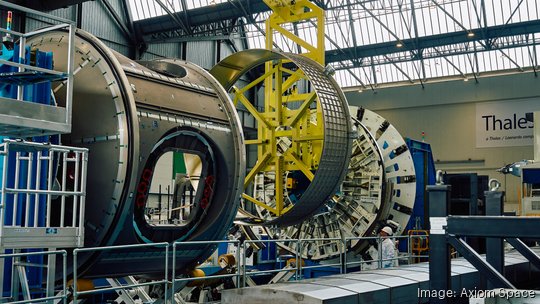
Rewinding to before the Spaceport campus took shape — why did Axiom decide to stay in Houston?
We've been very purposeful about being in Houston. There was a time a few years ago where we were being lured by the state of Florida with some economic incentives to move there, but we want to be a Houston company.
And there's huge advantages here. The city of Houston has really leaned forward for a number of years on space. You know, building the Spaceport at Ellington was probably seen seven, eight years ago as a crazy idea. But the mayor and Houston Airports kept pushing it, and now I think it's been very successful. It's gonna be very useful for us to to be connected to Ellington because we'll be able to fly modules in, do outfitting, fly them back to [Kennedy Space Center] for launch. So the city's invested in that, they've given us economic incentives to build there.
And on the state level, most recently with the Texas Space Commission, there's a huge amount of investment. The state of Texas really wants to be seen as a leader in aerospace — and especially in space and commercial space.
And then the last huge advantage to be here is the Johnson Space Center. One of my favorite examples are the space windows we're building for Axiom Station. Those are the largest space windows ever attempted. And when we first wanted to do a test of that space window, I knew that one of my former colleagues at NASA now is the space window expert in NASA. So I invited her over to talk to my young engineer who had never built the space window before. And she provided some guidance and some recommendations and told him things like, "We tried that on [the Space Shuttle]; that probably won't work." Because of that, he was able to build a very capable space window on his first try. And he wouldn't have been able to do that without a few hours of insight. And it's not that we couldn't do that from Florida or Alabama, but it's just easier when they're just five minutes away.
Regarding infrastructure developments such as NASA’s Exploration Park, was that expected, from an Axiom perspective?
I would say Exploration Park was a bit of a surprise. Certainly, the Texas Space Commission [and] the funding that the state of Texas has put into developing space economy has been a bit of a surprise.
The Spaceport has been around a while, and I think it took a bit more to get some traction. But it was always a resource that we knew was really valuable. And we wanted to be part of it. And with Intuitive Machines and Collins Aerospace [as anchor tenants], I think there's going to be a whole ecosystem that grows up around there. I can easily see a company coming in that offers, say, test capability that we all could share. That infrastructure was important to us. If the Spaceport hadn't existed, we probably would have had to figure out something [else], maybe build our own hangar or something there.
Axiom is currently leasing out the former Fry’s Electronics building. How will moving to the Spaceport campus take place? What’s the current status of the new facility?
[Leasing Fry's] was out of necessity. You know, the Fry's building was interesting because we needed a building that had a high ceiling, a 24-foot ceiling. And you can find a lot of that space in Houston. But for reasons I can't figure out, most of them are not air-conditioned.
Then the Fry's building became available, and we didn't know what kind of state it was in because it sat empty for a while. But we should have always thought to be in there because it's an amazing place to build a space station.
And then our [Axiom suits lab] building at 600 Gemini St. — when we won [a $228.5 million spacesuit contract from NASA in 2022], we were always intending to build our own spacesuit. When the next opportunity came, "We said well, let's go after it since we're gonna have to build our own suit anyway." Winning that contract let us look around to find more space since we couldn't fit both teams into the Fry's building. So we've just had to kind of expand and go where we could.
The intent, though, is that we build out the entire campus at the Spaceport and then everybody will be there. Offices for 2,000 people, all the laboratories, all the manufacturing, all the development, the training facility, probably a little daycare center and cafeteria will all be built out there. [The completion timeline for the Spaceport facility's next phase is yet to be determined, according to Axiom Space.]
If I’m a business that wants to contract with Axiom Space, what are you looking for?
I'd say probably large-scale precision machining, software development. Software people are hard to find, and we've outsourced some of the software development. So a company that has good software developers would be of interest.
But the interesting thing about building a space station or spacesuit is it really takes all kinds of capability and all kinds of skills. The suits lab has skillsets [ranging from] handling materials and seamstresses and sewers and soft goods designers to mechanical engineering, fluids engineering, and all kinds of manufacturing, and a lot of additive manufacturing. We're using a company in Katy to 3-D print our propulsion system.
Sign up here for the Houston Business Journal’s free morning and afternoon daily newsletters to receive the latest business news impacting greater Houston.
